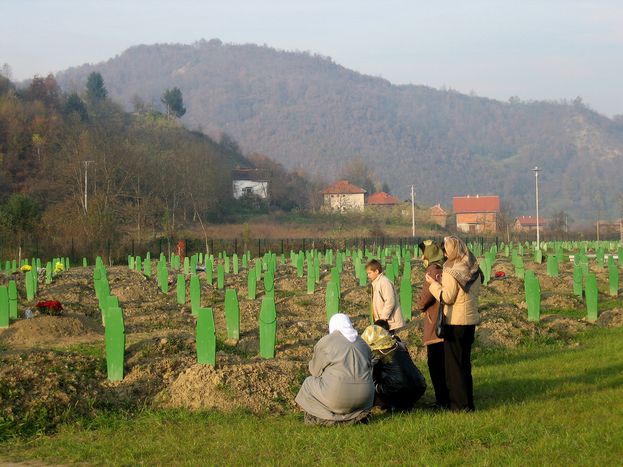
Remembering Srebrenica
Published on
July 14 the sees one of the largest joint trials ever seen in an international court, as seven members of the Bosnian Serb army are put on trial in connection with the Srebrenica massacre
On July 11 a grim ceremony was held commemorating the 1995 massacre of an estimated 8,000 Bosnian males in the UN ‘safe area’ of Srebrenica. As every year, thousands of people streamed into the Potocari Memorial site. As every year, Bosnian Serbs from the surrounding villages did not come to share the grief.
In the meantime, the families of the 505 victims identified this year were able to bury their loved ones. Those who are able to find the remains of their relatives are the lucky ones - the identification process is hampered by the attempts of the Bosnian Serb army to hide the bodies of the victims by reburying them in mass graves. In Srebrenica, the healing process will be a long one.
In memoriam
For a whole week in 1995, soldiers under the command of Bosnian Serb general Ratko Mladic were, according to the indictment of the international court, engaged in the organised and systematic killing of around 8,000 males from Srebrenica.
To date six former members of the Bosnian Serb army have been sentenced by the International Criminal Tribunal for the Former Yugoslavia (ICTY) for their part in Srebrenica genocide. However, the two people considered most responsible for the massacre – Bosnian Serb wartime leader Radovan Karadzic and his military chief Ratko Mladic – are still at large.
Despite these absences, the trial starting on July 14 will see seven members of the Bosnian army stand trial, accused of being part of a joint criminal enterprise to “murder able bodied Muslim men.” Colonel Ljubisa Beara, the Bosnian Serb army chief of security, and Ljubomir Borovcanin, the deputy commander of the Republika Srpska special police brigade, will both face charges of genocide.
Remaining unmoved
However, the trial is not expected to dramatically change public opinion in Serbia.
Natasa, a housewife from Belgrade, sums up a common sentiment amongst ordinary Serbs: “I don’t care for the trials conducted by The Hague. This court is only processing trials against Serbs” she said. “Just think about the release of Oric,” she pointed out angrily.
Naser Oric was the Bosnian Muslim commander of Srebrenica, whom Serbs hold responsible for the deaths of many Bosnian Serbs in the surrounding villages. On June 30 2006, the ICTY found him guilty of failing to prevent the murders and cruel treatment of Serb detainees in the town’s prison in 1992 and 1993. He was sentenced to two years in prison and released immediately, having already spent three years in custody. While the prosecution had asked for eighteen years, Oric was acquitted of all other charges. In Belgrade, Serbian officials expressed outrage over the two-year sentence handed to Oric. "The verdict brings into question the credibility of the court," said Aleksandar Simic, an adviser to Serbia's Prime Minister Vojislav Kostunica.
While Natasa claims the Oric decision is: “Another reason that Mladic should not be extradited,” others are not so sure. “I cannot see any future in Serbia as country which denies such crimes were committed in our name,” said Dragan Popovic from Youth Initiative, an NGO focusing on dealing with Serbia’s war crimes.
This year, the day after Srebrenica anniversary, Bosnian Serbs from the nearby village of Kravica commemorated their own victims - around 3000 civilians from the surrounding villages who they claim were killed by Bosnian Muslim army during the war. Remembrance continues to be an activity separated by the lines of war.



